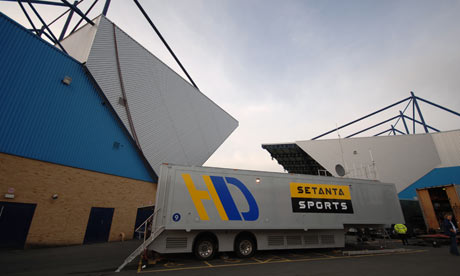
Not everyone would rue Setanta's demise but its collapse could herald the end of a golden era for British sport and the vast sums of money on which it has gorged itself for more than a decade. The Irish company was in crisis talks yesterday in an attempt to stay afloat but, if it fails to broker an 11th-hour deal with its backers, then the accountancy firm Deloitte could be appointed as administrators within days, according to sources close to the discussions. Setanta declined to comment.
If the company collapses it will have serious consequences for Premier League clubs in England and Scotland, which are awaiting payments totalling millions of pounds. One £3m instalment due to the Scottish Premier League is already a week late, prompting fears that Setanta has finally run out of cash.
Sky has been British sport's major benefactor since the late 80s but Setanta has assembled an impressive portfolio of rights, wooing less high-profile sports with the promise of more money and spending close to £500m in under five years. As it attempted to build a compelling offer for its 1.2m subscribers, some sports' dependence on Setanta's largesse increased.
The US PGA golf tour, boxing figures, the Indian Premier League and Premier Rugby are all owed money by the company. So, too, is the Football Association, which signed a £425m four-year deal with Setanta and ITV for England games and FA Cup matches. If Setanta goes into administration, it may not receive it.
The most powerful sports bodies, including the FA and Premier League, privately claim they have water-tight contracts with Setanta and argue its City backers, who include the private equity firms Doughty Hanson and Balderton Capital, have effectively guaranteed Setanta's payments. If Setanta does go under, that claim could ultimately be tested in the courts.
The Premier League is confident it can resell the rights to the 46 games Setanta holds for the 2009-10 season, the final year of its contract. It also believes it could match or exceed the £159m Setanta paid for the right to screen 23 Premier League games each season from 2010-11 if they are put out to offer. Many experts do not agree. One City consultant, who asked not to be named, said: "The Premier League believes football is like crack cocaine. They are wrong." Claire Enders, founder of the media research company Enders Analysis, said: "The FA has a view it will re-farm the rights for the same amount of money or more … It would be a miracle if that occurred."
Terrestrial broadcasters, including ITV and Five, are cutting costs in the wake of plummeting advertising revenues and there are few other potential bidders. ESPN, the US sports channel owned by Disney, is believed to be interested but it is likely to wait until Setanta goes into administration and attempt to buy the rights at a knockdown price.
Sky could pick up one of Setanta's two Premier League packages for the 2009-10 season but it is barred from buying both under competition rules. It cannot bid for the single package Setanta acquired from 2010 and beyond for the same reason. Sky has talked to Setanta about a wholesale deal that would see its 46 games show on Sky but balked at its demand for a £50m up-front payment.
Marc Sugarman, an analyst at Citibank, said: "We estimate that Setanta pays around £85m annually for SPL, FA rights, boxing and US PGA rights. We would expect these rights costs would more than halve [and] possibly fall by two-thirds." The impact on some of those sports could be catastrophic, particularly in football where the tendency to spend on the basis of projected earnings is widespread.
Setanta has tried to secure extra money from its investors to plug a £150m gap but has so far raised £100m. Those investors are unwilling to cough up more unless it can prove it has a viable business model. That rests on renegotiating rights deals.
Setanta's attempt to reach an agreement with its most important partner appear to have foundered in the face of Premier League intransigence but some rights holders, including the SPL and the FA, are believed to be more flexible. They recognise that, if Setanta went under and ESPN or another new market entrant decided to bid for their rights, it would be in an infinitely worse economic environment in which debt is more expensive and many consumers are cash-strapped.
Setanta's spending spree was financed with cheap money borrowed at the height of the economic bubble that burst when the credit crunch hit. If it survives, it will be because sports bodies allow it to reduce drastically its payments. A 10-year boom that allowed clubs to grow fat on a series of financial injections provided by cash-rich broadcasters may be about to end.

